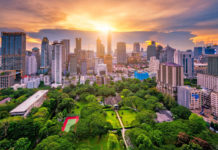Deciding Where To Live In Bangkok
Whenever you move to a new country it can be quite daunting at first, especially if you are unfamiliar with the city that you have chosen to live in. Most people move to Bangkok to take up a new job, start a business, and some for retirement, so deciding where to live is a question of priorities and basically a juggling exercise. The traffic in Bangkok can be very frustrating with what should be a ten minute journey, taking up to one hour depending on weather conditions, time of day, day of the week etc. With this in mind, you will need to decide who should have the least amount of travel time. Will it be the children to school, the breadwinner to work, or a compromise? Accessibility to public transport is important – particularly the BTS (skytrain) and the MRT (underground) as these serve many key points in the city and may be a good option for the office run. If you have a car, or prefer to use taxis, it is often helpful to live near to expressway on- and off-ramps.
Once you are close to selecting your final property, it is a good idea to visit at different times of the day to see how traffic is and whether your soi (street) has suddenly turned into a one-way street. How your area connects to the main artery roads will also be important as you could be on a cut through (commonly known as the ‘green route’) and what you thought is a small, quiet street, in fact, becomes gridlocked at certain times of the day.
How much rent will I pay?
Prices vary hugely and not necessarily with any logic! A lot depends on who the landlord is and what they believe they can get. It is helpful to use an agent as they can negotiate on your behalf. Agents generally do not charge fees but are paid through commission from the landlord. Expatriate areas tend to attract higher rental prices and blocks that have a lot of company rentals are also highly priced. In some central Sukhumvit areas you can pay over Bt 100,000 per month for a nice apartment. On the other hand, you can pay a lot less if you are willing to opt for a different area or an older style property. If you are alone or a small family, you can pick up a nice, well located, two bedroom furnished condo between Bt 30,000 to Bt 50,000 quite easily. The best advice is to take time and view a lot of properties until you get a feel for what is available. The same is true of prices for houses. Expect to pay higher rent for more facilities. A house with a pool or a condo with a lot of nice facilities will generally command a higher rent.
House or Condo?
To a large extent this is down to personal preference though, in the city itself, there will be a greater choice of condos and apartments in relation to houses. But there are plenty of houses around. If you do choose a house, be sure that it won’t flood in rainy season. When torrential rain hits the city the sois can quickly flood – even the main artery roads through the city will be under a couple of feet of water at times. Ask to visit some of the ‘moo baans’ (housing estates). These vary in size from a compound of 4 or more houses up to large estates with hundreds of houses. This can be a good option for families as usually it’s safe for the kids to ride their bikes around and visit other friends on the moo baan. If you have a single house, bear in mind that you will need to think about garden maintenance – check first to see if it can be covered in your negotiations on rental price.
What about security at home?
Apartment blocks and condos will generally have their own 24 hour security and often there will be key code entry for residents as an extra measure. In fact, Thailand is relatively safe compared to many other countries and whilst there are some problems with theft it is relatively rare. Moo baans (housing estates) are nearly always gated and also have 24 hour security. Single houses generally have large gates and walls and residents in some streets may pay for police presence.
What can I expect to pay for my utility bills?
Electricity is likely to be your highest bill particularly if you use a lot of air-conditioning. For a large apartment or house expect to pay Bt 7,000 per month (and anything up to Bt 15,000) if you are going to have a lot of units running. Also be aware that in apartments and condos you may pay your utilities through the landlord and it is common for the unit charge to be significantly higher than if you pay your bills directly to the provider. So, for example, in a single house, you will pay your bills direct at a lower unit cost which can lead to significant monthly savings.
Broadband/ADSL – monthly costs vary but budget for around Bt 1,200 per month.
Cable TV – costs vary according to the package but for a good selection cost is around Bt 2,000 per month.
Water- cost is negligible
Telephone – obviously depends on usage and with more and more people switching to web calls for overseas, costs are effectively dropping. Local calls are inexpensive.









